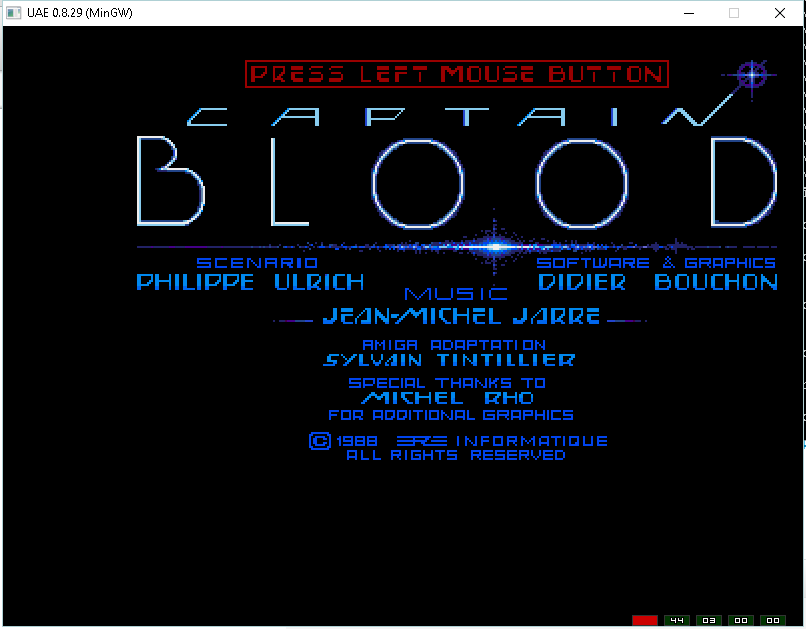This one should have been much easier to build, it has support for SDL built in, however the include files are a nested mess, and configure fails part of the way in the process leaving the source kinda messy. Â But a few hours over a couple of days, and here we are.
This version doesn’t run at warp speed, has sound, and is great. Â Â It wants a config file though. Â You can find the specs in the readme, but something like this:
#cpu_type=68030/68882
cpu_type=68040
cpu_speed=real
sound_channels=stereo
sound_bits=16
sound_frequency=44100
gfx_center_vertical=true
gfx_center_horizontal=true
gfx_color_mode=32bit
floppy0=df0.adf
works fine. Â This later (and seemingly last) branch of UAE Â incorporates lots from WinUAE, except for the JIT. Â It’s dated 2008, so it does include support for the 68030, 68040, and the 68881 and 68882. Â It doesn’t have MMU support, so things like Linux/AMIX/NetBSD/Enforcer are out of the question.
I dumped my source tree over on sourceforge, as I’m more so interested that this builds using MinGW.


Great stuff.
Personally I find this stuff interesting. Is there any chance this cold be backported to dos even? (even if it needed some sort of dos extender).
For my tastes dos still makes a great option as a host os for a dedicated emulator system. It’s tiny, easy to work with, easy to make “invisible”and so on.
Anyway, interesting reading one way or another. Thanks 🙂
I would venture a ‘maybe’. UAE used to run on MS-DOS via DJGPP. I guess it comes down to if it needs POSIX/Win32 only things like threads, but I don’t think so.
Of all the versions of UAE I had to hammer around to get working again on Win32 with SDL, this is the only one I didn’t have to do anything with, as it already had SDL support, and worked ‘out of the box’.
So, ‘maybe’?
OSes like, ironically, amiga os, and its clones like the binary compatible MorphOS, and open source, api compatible (and bin compatible on 68k build on actual amigas) AROS dont have “proper” threading for their variations of UAE. The SDL backends are used in some builds, and it works quite well.
Point being I guess, so long as it’s only tide lightly at worst to win32 it should work with something like HX Extender. Im under the impression sdl generally works pretty well there.
Take all this with a grain of salt by the way, it’s both a bit vague in my memory, and something I was only moderately familiar with in the first place 🙂
It’s not so much what it’s emulating, but how. If all the chipsets & cpu are expected to operate in parallel, using locking/mutex’s/messages to communicate it’d be a nightmare to port to MS-DOS … but if it’s just do xyz for a few cycles, then check other stuff maybe.
I just haven’t looked, but the other stuff should run.
HX DOS may just run it out of the box.
Yeah, I probably should have tried the options available to maybe run the win32 binary in dos first before I started asking about possibility of a DOS version 🙂
A native dos version would be nice, but I’ll see how I go with the above and let you know how I go.
You can also take the source to what I have on sourceforge, and fire up DJGPP and see how much of it actually compiles. Naturally the SDL stuff will bomb, but for the 0.4 version there isn’t all that much.